
In the face of growing concern about the global road trauma crisis, the role of road policing has never been more critical. With over 1.18 million people killed and tens of millions more injured annually on the world’s roads, the scale of road trauma is not just a transportation issue, it is a public health emergency. Governments and communities must act decisively. Policing of road safety laws, guided by evidence and executed with consistency, is central to that action.
The Global Road Safety Partnership (GRSP) stands firmly behind this principle, and recent recognition at the World Police Summit in Dubai reaffirms its global impact. GRSP was awarded the prestigious Excellence in Road Safety Award for its groundbreaking Road Policing Executive Leadership Course (RPELC). The course empowers senior police leaders with the tools, knowledge, and strategy to implement evidence-based enforcement rooted in the Safe System approach. Delivered in partnership with Johns Hopkins International Injury Research Unit and supported by Bloomberg Philanthropies, the RPELC is a shining example of how investment in policing leadership can translate into lives saved on the road.
Yet leadership and training are only part of the solution. A strong, clear, and unapologetic commitment to policing enforcement is essential. In a 2018 editorial published in The Lancet, the editors offered a sharp and timely critique of road safety efforts that rely solely on public awareness campaigns. “It is easy to suggest low-cost policies targeted at improving road safety, such as a campaign aimed at improving driver behaviour,” the editorial stated. “Such policies have little effect beyond giving the impression that the government is taking the issue seriously. If road users around the world can remain confident that they won’t be subject to their countries’ laws—due to insufficient enforcement—those laws will have no effect on driver behaviour and subsequently no effect on road traffic injuries.”
These words remain just as urgent today. GRSP wholeheartedly endorses this view and incorporates it into every aspect of its global programmes. Awareness alone is not enough. Enforcement must be a combination of visible and covert, credible, relentless and well publicised.
This philosophy is vividly illustrated in Poland’s success story. Since 2011, the country has transformed its approach to speed enforcement through the Centre for Automatic Traffic Enforcement (CANARD). With an extensive system of fixed speed cameras, section controls, and red-light enforcement, Poland has seen marked reductions in speeding and fatalities at monitored locations. The backbone of this success? Consistent enforcement, supported by advanced technology and data-driven systems.
Similarly, in Mombasa County, Kenya, GRSP—through the Bloomberg Philanthropies Initiative for Global Road Safety, has bolstered road policing efforts by training officers, enhancing investigative skills, and providing modern enforcement equipment. The introduction of laser speed detection devices, accompanied by hands-on training, is not just about catching speeders; it’s about creating an environment where drivers know the rules are real, and consequences are certain.
These case studies reaffirm what the research, experience, and common sense tell us: road policing works when it is respected and consistent. The illusion of action, through campaigns that lack enforcement backup, ultimately costs lives.
The international road safety community, including the GRSP, is united in its commitment to halving road deaths and serious injuries by 2030. But meeting this ambitious goal requires more than slogans. It demands strategic investment in police leadership, cutting-edge enforcement tools, robust legal frameworks, and most importantly, the unwavering political will to enforce the law.
Road policing is not an optional component of road safety. It is the cornerstone. It creates accountability, deters dangerous behaviour, and reinforces the social contract between governments and their citizens. As we move forward, the message must be clear and uncompromising: effective road policing saves lives, and without it, no amount of awareness will suffice.
GRSP will continue to champion road policing-led strategies, collaborate with global partners, and ensure that road safety is not just promised, but delivered. Together, with unwavering focus, we can turn the tide on road trauma.
Dave Cliff ONZM MStJ
CEO, Global Road Safety Partnership
Dubai, May 2025 – The Global Road Safety Partnership (GRSP) has been awarded the prestigious Excellence in Road Safety Award at the World Police Summit, held in Dubai. The award recognises GRSP’s outstanding contributions to advancing evidence-based road policing through its flagship initiative, the Road Policing Executive Leadership Course (RPELC).
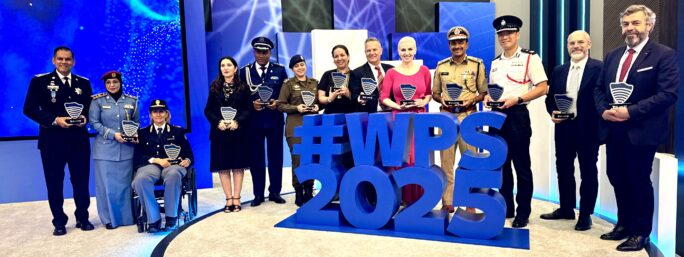
Dubai, May 2025 – The Global Road Safety Partnership (GRSP) has been awarded the prestigious Excellence in Road Safety Award at the World Police Summit, held in Dubai. The award recognizes GRSP’s outstanding contributions to advancing evidence-based road policing through its flagship initiative, the Road Policing Executive Leadership Course (RPELC).
The World Police Summit, hosted by the Dubai Police, brings together global police leaders to share best practices and shape the future of policing. GRSP expressed deep appreciation to the Dubai Police for their leadership and commitment in convening such a significant global event focused on excellence and innovation in policing.
GRSP’s RPELC is a pioneering programme designed for senior police and enforcement officials across the world. Its primary aim is to strengthen executive leadership capacity in addressing key road safety risks using strategic, evidence-based interventions. Delivered by road policing experts, global leaders, and academics, the course takes a comprehensive Safe System Approach, placing police at the centre of efforts to reduce road deaths and serious injuries.
“This award is a meaningful acknowledgment of the critically important work being delivered by international organisations such as GRSP and Johns Hopkins International Injury Research Unit to support police and enforcement agencies to achieve measurable and sustainable public health outcomes and improve road safety globally. We are honoured to be part of a community committed to making our roads safer for all” said GRSP’s Asia Pacific Manager Brett Harman, who accepted the award on behalf of GRSP.
“We are extremely proud to have received this award,” said Dave Cliff, CEO of the GRSP. “Road policing is essential to reducing the enormous burden of global road trauma, and ensuring police officers are well educated on the most effective policing mechanisms to make road users safer is the purpose of our programme.”
Key components of the RPELC include:
The programme is delivered in partnership with the Johns Hopkins International Injury Research Unit (JH-IIRU), with generous support from Bloomberg Philanthropies.
Dr. Abdulgafoor M. Bachani , Director of JH-IIRU, noted, “Our collaboration with GRSP in delivering this programme is making an enormous contribution to improving global road policing. We acknowledge the extraordinary support we have received from Bloomberg Philanthropies.”
As the international community continues its efforts to halve global road deaths and injuries by 2030, the need for evidence-based, strategically-led road policing has never been more urgent. GRSP’s recognition at the World Police Summit highlights the importance of investing in the education and leadership of police officers worldwide to save lives and prevent severe injuries on our roads.
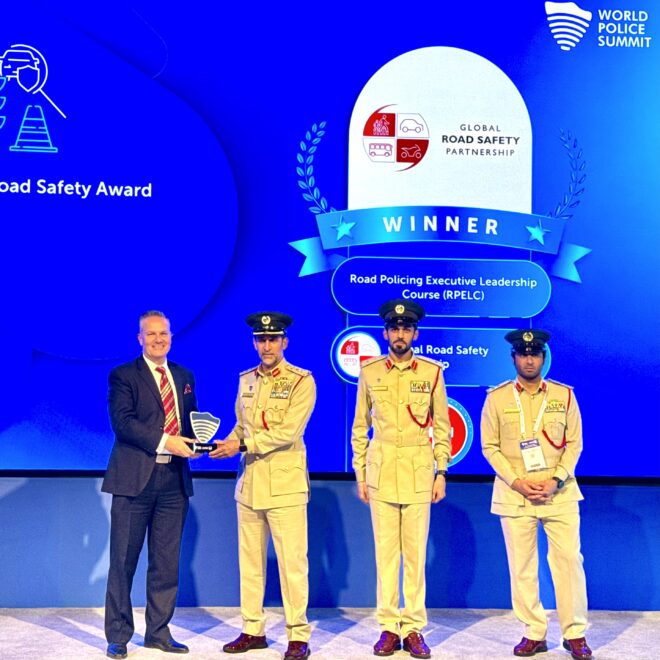

Poland’s automated speed enforcement system, managed by CANARD since 2011, has grown from fewer than 100 stationery cameras to a vast network using modern technologies. A key component in improving road safety, it has significantly reduced speeding and fatalities across monitored areas. A 2024 expansion under the post-COVID National Recovery Plan adds 128 new devices, further strengthening CANARD’s role in Poland’s comprehensive road safety strategy.
The origins of Poland’s centralised automated speed enforcement system date back to 2011. At that time, the Centre for Automatic Traffic Enforcement (pol. CANARD), a specialised unit of the General Inspectorate for Road Transport, began operating with less than 100 stationary speed cameras taken over from the local police and road authorities. It is worth noting that these devices were not the latest models and lacked features such as remote and wireless communication with the central IT system.
In subsequent years, the system underwent constant expansion, and projects were implemented to increase the effectiveness of the speed cameras system in Poland. These projects were co-financed by the European Union and involved purchasing devices offering the latest available technologies.
Between 2012 and 2014, a dedicated IT system was developed and implemented for handling registered speed offences. This advanced tool was designed specifically for this purpose. The system’s scale and importance are evident from the fact that it is still in use today and performs well in managing cases.
In 2015, 483 devices (speed cameras, average speed cameras and red-light cameras) were integrated into the CANARD system as part of a completed project. An effect of the devices’ work includes the registration of offences in the form of photographs containing, the time and location of the event, the image of the vehicle along with its registration number, the registered speed and the speed permitted at the offence location. The information constitutes a basis for commencing explanatory actions.
Improving road safety is one of the European Union’s key transport policy goals. The EU is taking action to reduce the number of fatalities, injuries and property damage caused by road crashes. A vital part of this strategy involves effectively and consistently enforcing penalties for traffic offences and violations that endanger road safety.
As a part of this goal another project to expand the speed camera network in Poland has been implemented by CANARD. Nowadays CANARD manages:
In 2024, CANARD began a new project under the post-COVID National Recovery Plan. The project aims to improve road safety on the national road network and involves purchasing and installing 128 new recording devices, including 43 section control devices, 70 fixed speed cameras, 10 red light cameras at road crossings and 5 devices for red light cameras at railway crossings.
What about statistics?
CANARD’s analysis shows that the number of vehicles exceeding the speed limit has decreased in the vast majority of locations. In fact, a decrease in the number of fatalities was seen in as many as 97% of locations.
It is worth noting that only 260 people work on the CANARD system and achieving this result would not be possible without modern speed cameras and IT tools. The system of automatic traffic enforcement is an important and complementary part of Poland’s road safety system.
In May 2025, the Asia Pacific Region of the Global Road Safety Partnership (GRSP), as part of the Bloomberg Philanthropies Initiative for Global Road Safety (BIGRS), concluded a two week ‘Training the Trainers’ capacity-building workshop focused on speed enforcement. These work was held in collaboration with the Maharashtra State Highway Police (HSP) and Pune Rural Police.
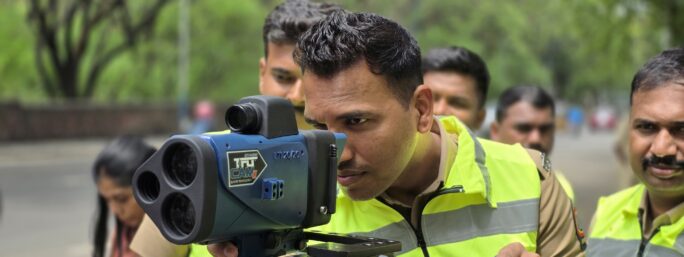
In May 2025, the Asia Pacific Region of the Global Road Safety Partnership (GRSP), as part of the Bloomberg Philanthropies Initiative for Global Road Safety (BIGRS), concluded a two week ‘Training the Trainers’ capacity-building workshop focused on speed enforcement. These work was held in collaboration with the Maharashtra State Highway Police (HSP) and Pune Rural Police.
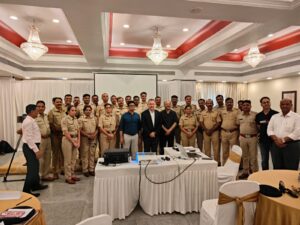
The workshop took place in Thane for HSP officers and in the Pune Rural policing district for Pune Rural Police staff. Participating officers explored the “Safe System” approach to road safety, with a strong emphasis on speed as a key risk factor. They examined how increased speed elevates both the likelihood and severity of road traffic collisions.
In addition to classroom discussions on enforcement strategies and the use of speed detection equipment, attendees received hands-on training in laser speed camera technology and safe roadside operating procedures. This practical training is intended to establish a solid foundation for consistent, year-round speed enforcement.
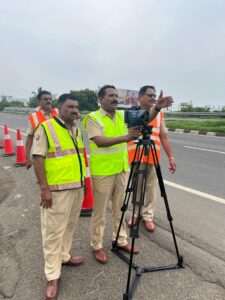
Following the workshops, a six-month pilot programme will be launched in selected locations across the Maharashtra highway network, including Pune Rural Police. With support from Bloomberg Philanthropies, GRSP has procured eight laser speed camera devices to facilitate evidence-based enforcement during the pilot period. A public media campaign will also accompany the initiative.
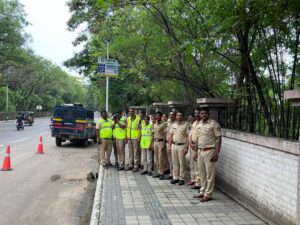
Data will be collected before, during, and after the pilot to assess its impact. Additional training and ongoing support will be provided to HSP and Pune Rural Police officers to ensure the integration of best practices in speed enforcement.
This initiative aims to reduce crash fatalities and serious injuries across Maharashtra by applying an evidence-based, Safe System approach to speed enforcement—prioritizing long-term impact and data-driven evaluation.
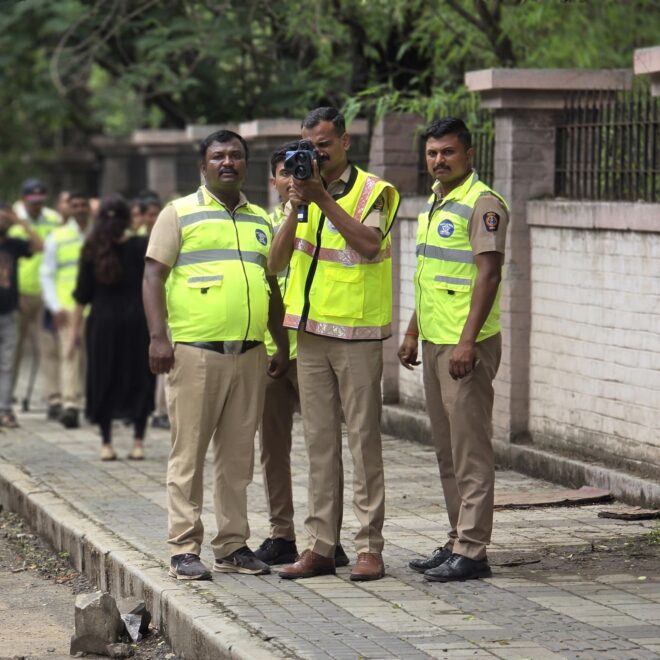
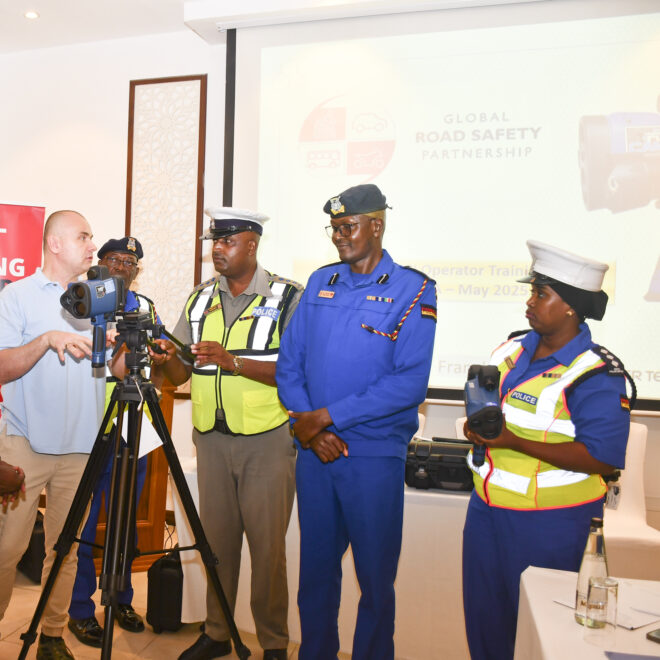
The Bloomberg Philanthropies Initiative for Global Road Safety (BIGRS) and Vital Strategies partnered with the Global Road Safety Partnership (GRSP) to host a workshop for media professionals and key stakeholders with the aim to strengthen engagement on road safety issues.
Subsequently, as part of the Road Policing Capacity Building Programme, GRSP, an implementing partner of BIGRS had facilitated the handover of eight laser speed guns in Mombasa and a series of trainings to further support road safety efforts in the region.
The Bloomberg Philanthropies Initiative for Global Road Safety (BIGRS) and Vital Strategies partnered with the Global Road Safety Partnership (GRSP) to host a workshop for media professionals and key stakeholders. The aim was to strengthen engagement on road safety issues, with a focus on road policing and behaviour change. A key objective of the workshop was to highlight the media’s vital role in publicising road policing which increases its affect by warning drivers that unsafe driving is likely to result in detection and penalties, positioning it as an integral component of the Safe System approach.
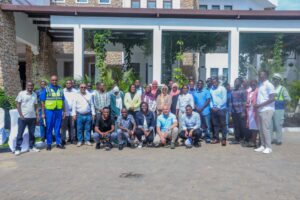
Subsequently, a three-day Crash Investigation ‘Trainers the Trainers’ workshop was conducted in May for police officers in Mombasa County. The workshop aimed to develop skilled and capable instructors who can effectively deliver road safety training to a broader audience. Key topics included the qualities of an effective trainer, principles of securing a road crash scene and identifying and documenting key evidence.
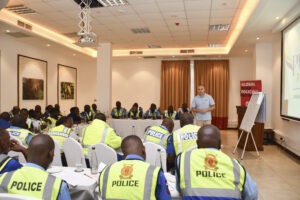
Participants also explored basic calculations related to vehicle speed, distance travelled, and reaction time based on skid marks. Other important topics included the role of witnesses, crash scene sketching, and photographic documentation. The workshop featured group activities such as analysing crash scenarios to identify potential causal factors and calculating speed.
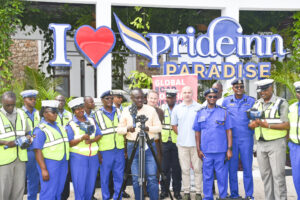
As part of the Road Policing Capacity Building Programme, GRSP, an implementing partner of BIGRS had facilitated the handover of eight laser speed guns in Mombasa. The ceremony was attended by Mombasa police leadership, county representatives, and a delegation of officers from Nairobi Police Headquarters. The new equipment will further support road safety efforts in the region.
Following the handover, a two-day training session was conducted for police officers responsible for operating the speed detection devices. Led by a representative from the equipment manufacturer and GRSP, the training covered device operation, maintenance, and procedures for capturing photo and video evidence to support enforcement and court proceedings. A total of 45 officers participated in the training.
Senior Constable Graeme Buttar, also known as ‘Marge’ by his friends and colleagues has dedicated himself to Road Policing in New Zealand for the past 27 and a half years.
He shares his experience and role in the Police.
My name is Senior Constable Graeme Buttar, but my friends and colleagues call me ‘Marge’. I grew up on a farm in South Otago, New Zealand and had a life rich in rural experiences before joining the New Zealand Police nearly 32 years ago. In fact, before joining the Police, I worked as a taxi driver, which was an amazing insight into people and how to relate to folks from all walks of life.
For the past 27 and a half years, my role in the Police has been dedicated to Road Policing, something I am passionate about. This role is extremely varied. From training and developing new staff in the use of radar and laser, working as a professional police driving instructor, to providing input on our Road Policing tactics – no two days are the same, and that is what keeps me motivated.

The area that I police – and also call the best office in the world – is Central Otago. Within the Southern Policing District, situated in the lower part of New Zealand’s South Island, we have the largest roading network of any Police District in the country.
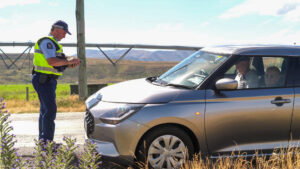
The Skoda Highway Patrol vehicles we use are equipped with Stalker DSR radar units, with both front and rear antennas. These units are easy to use, extremely accurate, and in the hands of a good operator, the speed of any vehicle in sight can be detected. The radar operates in both moving and stationary modes and can track the speeds of vehicles moving towards or away from us.
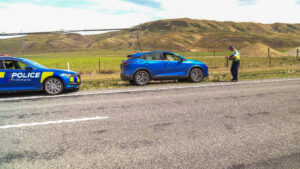
Before heading out onto the highways each day, we conduct a calibration check using tuning forks and record the results in a logbook. Hand-held lasers are also used from time to time, particularly during special operations targeting speed.

All infringement notices we issue are created on our phones and mailed to the offender, or we provide a payment advice card on the spot so that offending drivers can pay online.
The Skoda police vehicle I currently use is all-wheel drive, which definitely comes in handy during our winters when temperatures can drop to -10°C or below. Snow on our mountain passes is common. To improve traction and safety during the colder months, contractors apply grit to the roads. Salt is not used on New Zealand roads, but a chemical de-icing agent called CMA is applied in liquid form. During the summer months, temperatures can reach the mid-30s °C, which is great if you’re at the beach, but a bit of a test given all the kit we wear on every shift.
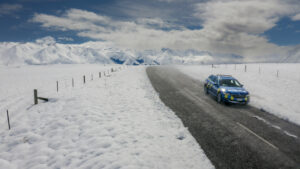
However, the spectacular scenery I travel through each day never gets old. After driving millions of kilometres on these roads, I never tire of the lakes, mountains, and big sky country, it really is a great view from my driver’s seat.
Due to these scenic highlights, the area is a magnet for tourists, meaning many drivers from all over the world. Many of them have never driven on roads like ours and often struggle to obey speed limits, keep left, and avoid distractions.

As a result, the Southern Police District receives the highest number of driving complaints in New Zealand. Poor driving is reported by members of the public via phone calls to a communications centre, and these jobs are then dispatched to nearby policing units. A very high percentage of these complaints are resolved, thanks to our motivated staff and the partnership we have with local rental car companies.
We follow a philosophy of highly visible, sustained enforcement, targeting high-risk areas at high-risk times. All of this is evidence-based, using intelligence and local knowledge. However, our goal of keeping serious injuries and fatalities to a minimum is not a task we undertake alone. We work collaboratively with Waka Kotahi NZTA (New Zealand Transport Agency), road contracting engineers, and other emergency services such as Fire Rescue and St John Ambulance. Education, engineering, and enforcement, the three Es, are valuable tools we use in conjunction with our partner agencies.
I’m also fortunate to be involved in a number of other programmes from time to time, including the filming of a television series called Highway Cops. We’ve just finished filming Season 10; the show has been running for 14 years. It’s an observational documentary that lifts the curtain on the work we do in road policing and the myriad of characters we meet along the way. The show has been an effective tool in promoting road safety to the public.
While the primary focus of my role is patrolling highways and byways, I still have to stay up to date with all police enforcement practices. We often come across offending that isn’t traffic-related, and since my district is largely rural, we’re often the nearest first responders.
A unique aspect of our job is that we mainly work alone. If we get into trouble, the closest back-up may be an hour or more away. This means we must constantly assess risk and apply all tactical options at every vehicle stop. Fortunately, New Zealand remains relatively safe, but we can never take anything for granted.
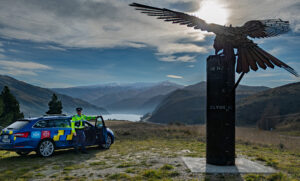
I am truly privileged to have the position I hold, and I take the role of keeping our roads safe very seriously.
Photo credits: Seeing Red Media/Mark Orton
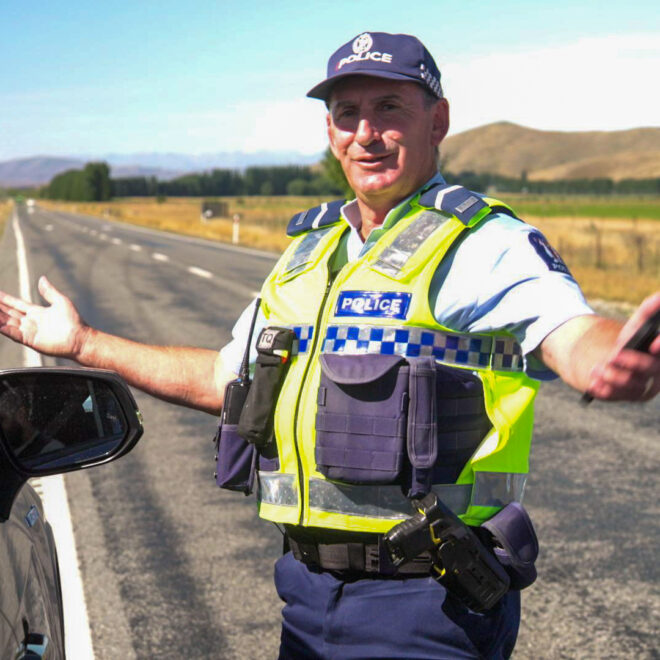
Next month, we’ll be launching a short survey to better understand your needs and explore new ways to engage and grow with our network. Your voice matters! Keep an eye on your inbox and don’t miss the chance to share your thoughts and help us shape what’s next!